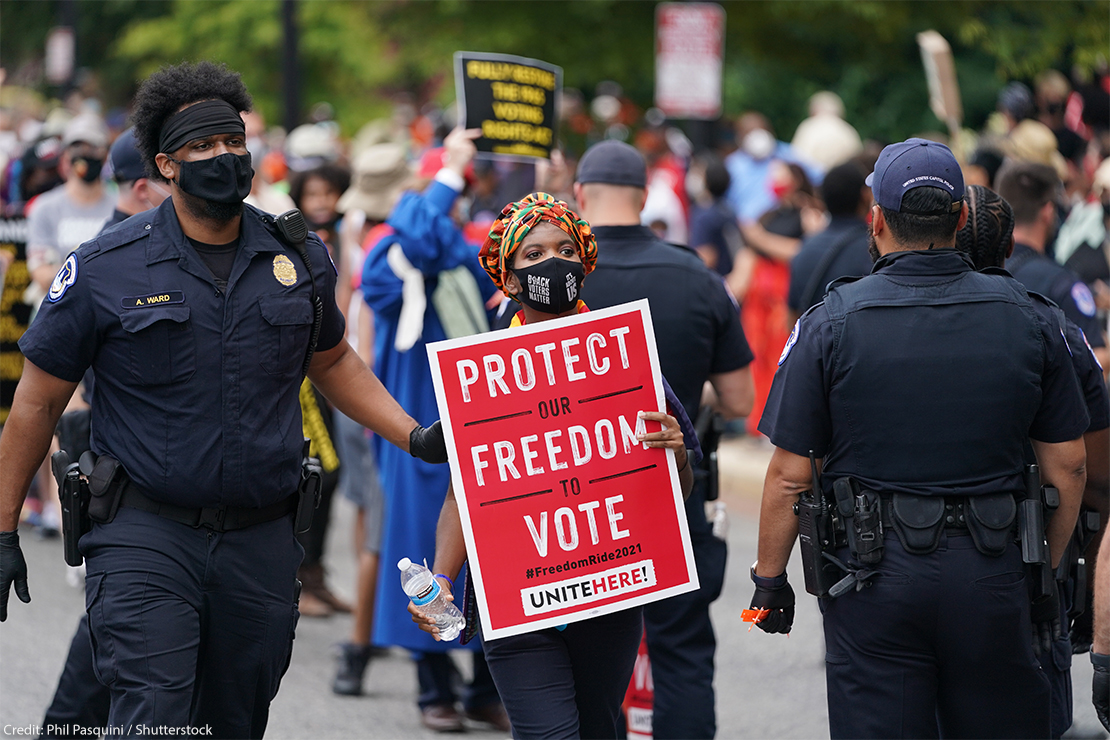Ten years ago, the U.S. Supreme Court delivered one of the most devastating blows to voting rights in our lifetime: Shelby County v. Holder. The ruling struck down key provisions of the Voting Rights Act of 1965 (VRA), which had successfully protected Black, Brown, Indigenous, and other marginalized voters for decades. In her dissent in that case, the late Justice Ruth Bader Ginsburg warned that the court’s decision was “like throwing away your umbrella in a rainstorm.” Today, we are drenched in the downpour. Shelby County unleashed a torrent of voter suppression and other discriminatory voting laws unlike anything the country had seen in a generation.
The VRA provides many critical mechanisms for ensuring that people from racial and language minorities across the nation can exercise their fundamental right to vote without encountering discriminatory barriers. While the 15th Amendment was adopted in 1870 and — at least on paper — prohibited the denial of the right to vote on account of race or color, in reality, states and localities defiantly continued policies and practices designed to prevent Black and Brown voters from casting ballots.
This 10th anniversary of the devastating Shelby County decision confirms our collective need to double down on our efforts to fully restore the VRA to its full power, which Congress must do by passing the John Lewis Voting Rights Advancement Act.
The VRA created strong, enforceable legal protections that rooted out many of these racist voter suppression tactics. As originally designed, it featured a crucial requirement known as “preclearance” that mandated that states and localities with long records of racially discriminatory voting practices seek federal approval before making any alterations to their voting laws. Unlike litigation, which occurs after a law is passed, preclearance uniquely curtailed racially discriminatory measures before they were implemented and could irreversibly taint an election.
One decade ago, the Supreme Court dismantled and gutted this crucial prophylactic measure. Now, even places with the most egregious records of racially discriminatory voting practices face an easier path to suppressing the vote of the most marginalized communities. On top of this, eight years after Shelby, the Supreme Court weakened another provision of the VRA — Section 2, a nationwide ban on voting practices that discriminate on the basis of race, color, or language — making court challenges to discriminatory tactics even harder. The Supreme Court fortunately bucked this trend in its recent decision, Allen v. Milligan, a case brought by the ACLU, the NAACP LDF, and partners. In Milligan, the court upheld a lower court’s ruling that Alabama’s congressional districts map violated Section 2 by diluting Black voting power. In doing so, the court is reaffirming Section 2’s protections against racial gerrymandering. However, while an important victory, this decision simply preserved what remains of the VRA and did nothing to address the previous blows the court dealt.
We will continue to challenge anti-voter laws and discriminatory voting practices in the courts. But our work does not end there. This 10th anniversary of the devastating Shelby County decision confirms our collective need to double down on our efforts to fully restore the VRA to its full power, which Congress must do by passing the John Lewis Voting Rights Advancement Act.
Voters across the country still face arbitrary restrictions on absentee voting, bans on providing water to voters as they wait in hours-long lines, drop box limitations, polling site closures, gerrymandering, and other restrictive policies that disproportionately burden voters of color, voters with disabilities, and elderly voters, among others. As we head into another election year, we face an urgent need to grow and activate our collective power.
That’s why the ACLU, on this anniversary of Shelby County v. Holder, is launching a brand-new Democracy Defender program, powered by members like you across the country who want to join us on the front lines in our work to protect voting rights and end racially discriminatory voting practices.
The right to vote and our democracy face increasing attacks at the federal, state, and local levels. So, we must fight back at every level. Democracy Defenders will do just that. Supporters like you will work alongside us in some of the biggest voting rights battles across the country. Plus, we will keep you in the loop as we work together for equitable access to the ballot, to preserve the integrity of our electoral process, and in defense of the very foundations of our democracy.

